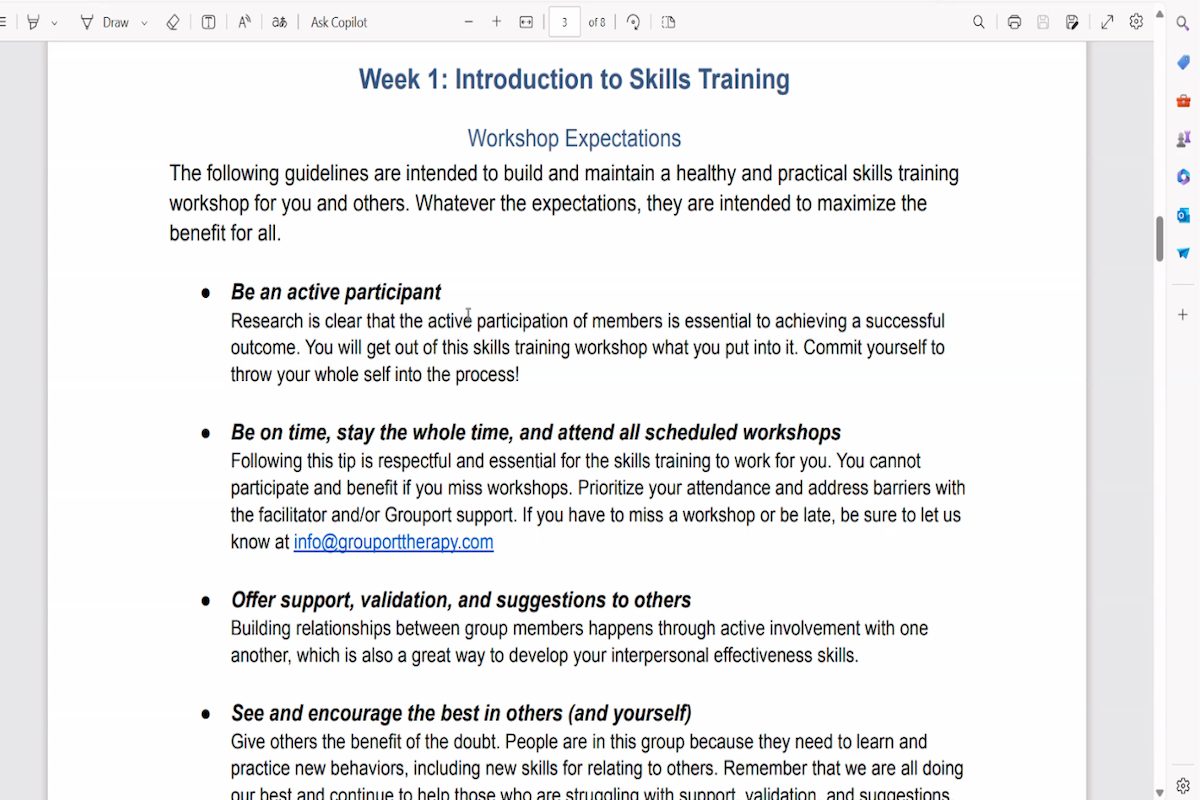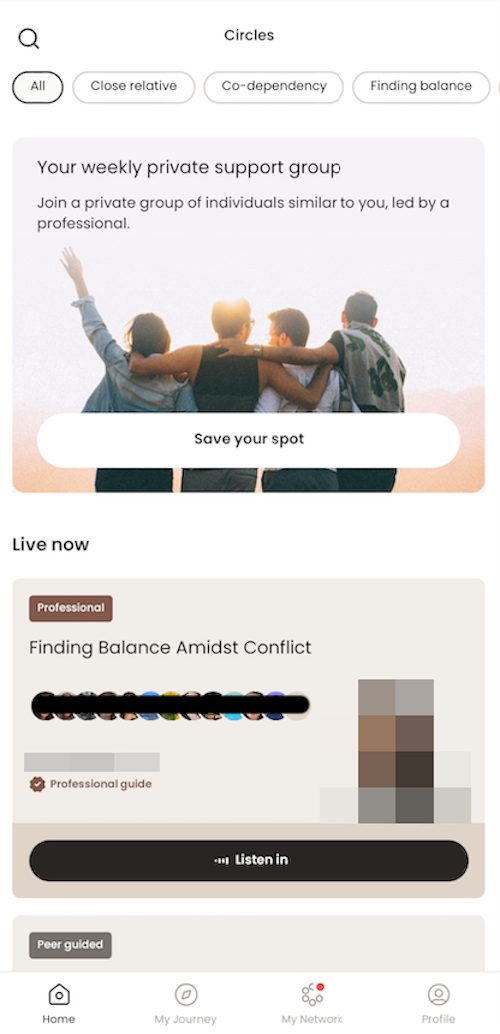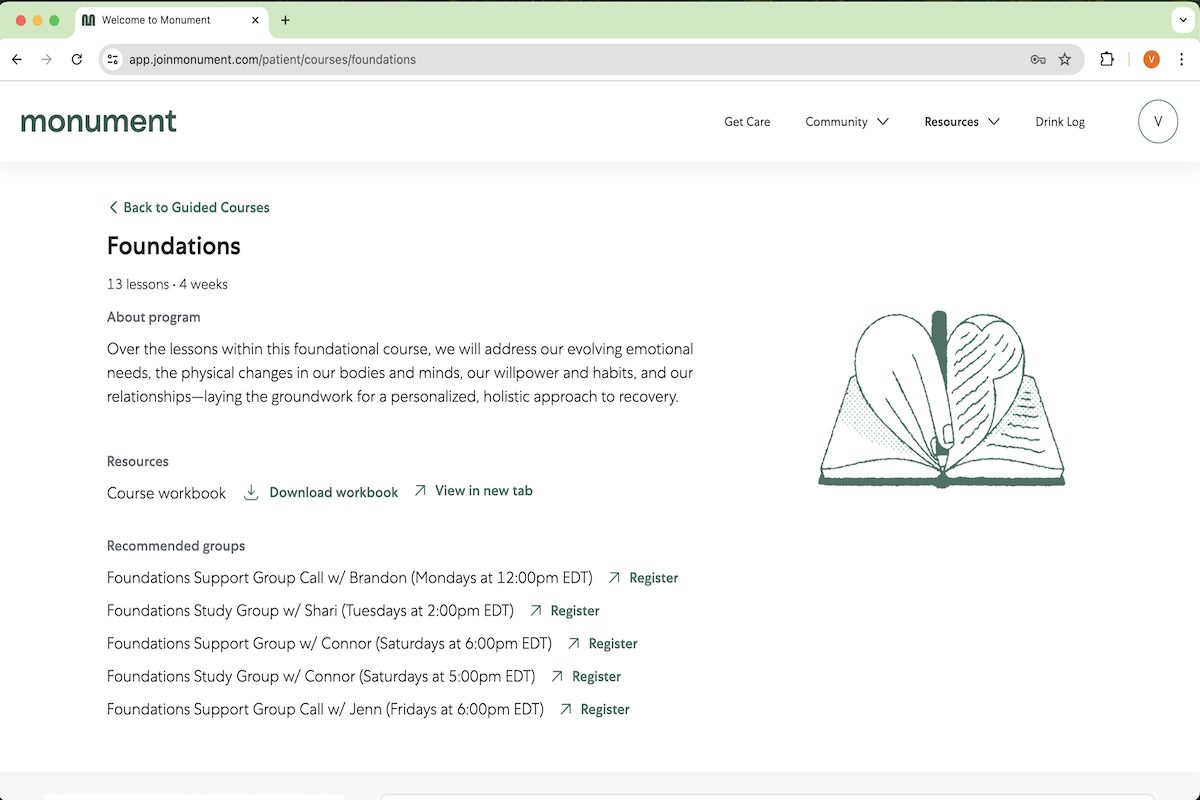Table of Contents
- We spent more than 10,000 hours researching more than 70 online therapy platforms, and our testers signed up for the 20 most popular platforms to bring you our top picks.
- Our testers use each platform for at least two to four weeks, focusing on the sign-up process, group selection, group therapy session quality, and customer service interactions.
- We surveyed more than 2,000 online therapy users, held focus group interviews with both users and therapists, and consulted more than 60 mental health experts.
- We vet group therapy platforms for their diversity in group topics, costs, features, and facilitators to find the most trustworthy, affordable, and relatable options.
- Learn more about how we test online group therapy platforms.
Key takeaways
- Grouport is our best overall choice for online group therapy. Support groups led by therapists on BetterHelp, Circles, and Monument are choices worth considering..
- The online group-based support platforms we cover here cost between $14.90–$280 per month.
- We looked for platforms that offered online mental health support facilitated by licensed therapists, helpful extra features such as self-guided lessons or group chats, and options to engage with other types of online therapy.
- Though support groups and group therapy can be similar, they can differ in the facilitator’s qualifications and the session’s goals.
Group therapy is one option to consider when choosing an online therapy platform. Online group therapy led by professionals and support groups offer ways to connect with a supportive community of others going through similar struggles and to learn new coping skills. You can also attend group therapy, support groups, or group learning sessions alongside individual online therapy to build on what you learn in those appointments.
It’s important to know that group therapy is different from a support group, and that the platforms on our list offer different options. Group therapy is a type of psychotherapy and is always led by a mental health professional. It is meant to provide you with expert guidance and insights in addition to support. Support groups are sometimes led by a professional therapist or counselor, but there are also peer-led support groups, also called mutual support groups, that are led by trained volunteers. These are meant to provide support and encouragement from others with similar experiences. Read our review of the top four platforms for online group therapy and support groups to learn more.
4 best online group therapy and support groups of 2024
- Grouport: Best overall
- BetterHelp: Best for group learning classes
- Circles: Best for divorce support
- Monument: Best for alcohol support groups
Data privacy on mental health platforms
The Health Information Portability and Accountability Act (HIPAA) only protects the interactions and records between you and your provider during the visit. However, online therapy platforms may still collect data on their users to use for marketing or research. We recommend understanding how your data is collected and used before signing up for a platform. To do this and guard your private data in general, we recommend the following basic steps that we learned from the U.S. Department of Health and Human Services (HSS) and Mozilla Foundation’s *Privacy Not Included project:
- Attend your online therapy appointment from a private location, preferably not on a public Wi-Fi network.
- Use your personal computer when possible.
- Look out for checkboxes during sign-up to opt out of data tracking or medical information disclosure.
- Sign up with your email, not by using a social login like Facebook.
- Choose a strong password to create a secure account login.
- Review the platform’s privacy guidelines, typically found on the website’s Privacy Policy page, to understand whether and how the platform collects, stores, and shares private information.
Grouport: Best overall group therapy platform
Why Grouport is our pick for best overall
We like that Grouport has regular weekly group therapy sessions that are facilitated by licensed therapists, and that users can browse through available sessions to get an idea of the time commitments, facilitators, and group goals before signing up. The platform also offers a group-based, facilitator-led course on dialectical behavior therapy (DBT), where participants can learn skills to help regulate their emotions.
Who may like Grouport: People seeking smaller groups (12 or fewer) to support the following concerns: obsessive-compulsive disorder (OCD), anxiety, depression, grief, loss, relationship issues, trauma, and post-traumatic stress disorder (PTSD).
Who may want to avoid Grouport: As of our testing, people looking for group sessions on Fridays, Saturdays, or Sundays may be unable to find a regular group session that fits their schedule.
Though Grouport has specific groups for people with certain diagnoses, its groups are open to people looking for mental health support in general. It’s the only platform we found that offers an online questionnaire and a 20-minute live initial consultation to match users with a group that fits their goals. You can also select your own group to join if you prefer. We like that groups are available for users in all 50 states and internationally.
Grouport tester and user insights
One of our testers notes that it was easy to view the different types of groups available on the Grouport website before signing up for the platform. Users can choose a group for themselves or be matched with a group that’s right for them by scheduling an initial consultation.
From one of our Grouport testers:
“It was easy to explore the different groups available based on the time, days, and topic. I felt like I was in control of choosing when I wanted to connect with the group without changing my schedule too much.”
Another tester signed up for the DBT skills group and reports that they were pleasantly surprised by their experience. Their session was conducted over Zoom and the therapist started by going over a group agreement and then moving into the curriculum for the week.

Group members were given a brief discussion period at the end to share their reflections about the lesson and were given optional homework for the week.
From one of our Grouport testers:
“[The] DBT group sessions feel informative, well-paced, and community-oriented. I would recommend them to a friend.”
To get the most out of an online group therapy session on Grouport, our testers recommend being flexible and open-minded. They found that fully engaging with the group therapy process requires being vulnerable among strangers. Grouport also offers online family therapy, couples therapy, individual therapy for adults, and individual online therapy for teens.
To learn more, read our Grouport review.
BetterHelp: Best for group learning classes
Why BetterHelp is our pick for best for group learning classes
BetterHelp is one of our best online therapy platforms because its therapy subscription includes many helpful resources that support mental health, such as its group classes. Our team likes that the platform’s group classes offer a structured way to learn, reflect, and build skills for mental health. In addition, our testers found that their actual experience with the classes was more interactive than they expected. They found that the classes included a robust discussion and sharing among group members, similar to a support group, even though all users are anonymous in the group classes.
Who may like BetterHelp: Individuals looking to get one-on-one online therapy in addition to group support may benefit from BetterHelp’s subscription. Group classes can help people already going through therapy to integrate and learn new skills for their mental health.
Who may want to avoid BetterHelp: Classes aren’t limited to a certain number of participants. If you’re looking for smaller groups with more emphasis on individual experiences, you may not get the close interaction you’re looking for through BetterHelp group classes. And if you’re not interested in individual online therapy, there may be more affordable options for online group support platforms.
Group classes are 60 minutes long, scheduled throughout the week, and are led by BetterHelp therapists. Users can sign up for as many classes as they’d like. Topics range from introductory “Welcome to Online Therapy” classes that help users make the most of their online therapy experience to skill-building classes and classes for specific concerns like anxiety, depression, relationships, and anger management.
BetterHelp tester and user insights
Our testers’ experience with the group classes on BetterHelp gave insight into how some individuals may benefit from group interaction as a part of their mental health care.

According to BetterHelp customer service, group classes are presented as live video lectures where users can learn and interact with others and the lecturer through a chat box. One of our testers had a positive experience with the group classes, saying that they felt seen and heard by being part of a group of peers who shared similar concerns.
From one of our BetterHelp testers:
“Based on my experience, I’d highly recommend that someone using BetterHelp take advantage of group classes. They’re a great way to connect with people who are facing similar struggles.”
During testing, we learned that each group class is led by a BetterHelp therapist and is facilitated in their individual teaching style. Our testers say that some classes are more interactive than others, depending on the therapist. Users may have to attend a few different sessions to find the group and facilitator that resonates best with them.
Read our in-depth BetterHelp review for more information.
Circles: Best for divorce support
Why Circles is our pick for best for supporting people affected by divorce
Circles is an online emotional group support platform with therapists, counselors (called professionals), and peers leading audio-only support groups (called Circles), which are scheduled seven days a week. Sessions have a large educational component and explore topics that can be helpful for people looking for online therapy for divorce, breakups, or narcissistic relationships, including:
- Intimate relationships.
- Co-parenting.
- Anger and resentment.
- Healing after a breakup.
- Codependency.
- Finding balance.
- Isolation.
- Loss of identity.
- Self worth.
- Trust issues.
- Understanding narcissism.
Who may like Circles: People going through a divorce or breakup and who want a community of support and educational resources, including audio group sessions. The group chats can be a source of ongoing support that exposes users to helpful resources, different perspectives, and a community of individuals with similar experiences. Circles also offers support to those who are affected by narcissistic relationships and narcissistic personality disorder.
Who may want to avoid Circles: People looking for live video rather than audio sessions, individual therapy, or marriage or family counseling to prevent divorce. Those who are currently in a narcissistic relationship may need to work with a mental health professional individually before joining support groups like Circles.
Circles sessions can be “open” (new members allowed in at any time) or “closed” (only members signed up for the session are admitted) and users can join as many as they want. There are lots of open Circles for anyone to join and participate at any time, whereas private Circles are limited in number and are curated by a professional facilitator. One of our testers is especially privacy-conscious and prefers interacting with their private group of seven peers over the open Circles.
Circles also has a blog with articles written by group facilitators and therapists. You can browse the posts by topic. Some of the topics related to divorce include parenting challenges, financial worries, managing emotions, post-divorce identity, and social isolation.
Safety and privacy on Circles
Online group platforms, like Circles, may have open sessions for anyone to join and share. Not all online platforms verify the identities of their users, so it can be up to the community to report malicious activity and users that make others feel unsafe. Online platforms, including Circles, often have a Report User feature to keep their community safe.
In addition, Circles customer service recommends not sharing your personal contact information and only sharing your real name and profile picture if you’re comfortable with it. You can read Circles’s user agreement here.
You can also report unsafe online activity or threats to your local police department. If you’re having an emergency, however, call 911.
Circles tester and user insights
One of our Circles testers found that there were many opportunities to join live sessions, especially during the evening hours, and that these group sessions can have as many as 50 participants. The size of the groups may be daunting for some, but one tester says they felt more comfortable in large groups because there was less pressure to share.
From one of our Circles testers:
“The session I was in had a lot of people, but I could still see that everyone was engaged because we had the option to react, chat, and raise our hands. It was my first session of that size, and I felt like I didn’t have to engage with the group right away because there were so many participants.”
Each group session is 60 minutes long and audio only, unlike other online group therapy and group support sessions that typically connect via video. Sessions follow a pattern, with a lesson led by the facilitator and then a discussion, where participants are invited to share their reflections or perspectives.

One of our testers who downloaded the Circles app from Google Play encountered some technical difficulties when attending live sessions. They report being disconnected from sessions without warning, sometimes more than once in a session, which affected their ability to stay engaged. In addition, customer service could only be contacted through the app, which sometimes had trouble loading.
Users can also participate in Circles groups that are facilitated by professionals who guide the topic and discussion. Peers in the group chats are welcome to contribute to the discussion at any time, and one tester shared that many of the chats were very supportive and offered helpful links, resources, and motivational tools to continue the discussion outside of the weekly sessions. Overall, our testers say they found the platform to be supportive and engaging.
While we like the large number of groups that are available, one of our testers joined many different open groups and received a lot of notifications from the Circles app. For people who may feel overwhelmed or distracted by frequent notifications, we recommend joining just one open or private group to start.
Monument: Best for alcohol use support groups
Why Monument is our pick for best for alcohol use support groups
Monument is an online platform that supports people with alcohol use disorder (AUD). It offers many peer-led support groups and resources that focus on supporting people struggling with AUD and want to change their habits or relationship to alcohol.
Support groups last one hour and are moderated by coaches and clinical professionals covering topics such as:
- Stress and anxiety.
- Mindfulness.
- Self-esteem.
- Family and relationships.
- Sobriety.
- Moderation.
- Grief.
- Depression.
- Trauma.
- Parenting.
- Dry January.
Groups may also center on the experiences of specific identities, such as Black, Indigenous, people of color (BIPOC), men, women, young adults, LGBTQIA+, 50 and older, and older adults.
Who may like Monument: If you’re struggling with AUD or are affected by AUD, Monument has resources and a supportive community on its online platform. Users have the option to access online therapy and telemedicine that’s specialized to support people with AUD, as well.
Who may want to avoid Monument: If you are looking for help with an addiction or mental health concern not related to alcohol. Also, individuals looking for a diversity of physicians may not have much choice on the platform.
Monument tester and user insights
Overall, our Monument testers were impressed with the support groups offered on the online addiction counseling platform. Testers say the support groups they attended were well-run and organized by their moderators, who created a welcoming, structured, and engaging environment for the group to share. The support groups they joined ranged from six to 20 participants, with lots of opportunities for participants to share and create networks of support.
In addition to support groups, Monument users have access to self-guided courses, which have their own support groups and study groups that users can join. For example, one of our testers explored a course focused on understanding the foundations of mental health, from the connection between physical and mental health to willpower and habits.

Compared to the active group discussions on Circles, one of our Monument testers notes that the 24/7 anonymous Community Chat forum wasn’t very active.
From one of our Monument testers:
“I think you could find a more active community in a Facebook group. Obviously, you would not have anonymity [on Facebook], but the channels in Monument are seriously like crickets.”
Another of our testers notes that there weren’t many physicians to choose from with the medication-assisted treatment add-on. A study that looked at diversity in health care professions in 2019 showed that Black, Hispanic, and Native American people were underrepresented among providers. Research suggests that a shared identity between patients and providers—for example, having the same racial identity—may help build trust, make patients feel more comfortable, and ultimately improve health outcomes.
For more information, read our in-depth Monument review.
How we test and choose the best online group therapy platforms
The Handbook Team researched over 70 online individual and group therapy platforms, directories, and networks. Of the 20 most popular platforms, we found 14 that offer online group therapy and group support, and we compiled our results based on weeks of testing and research. We made sure to vet platforms that had licensed mental health experts leading or facilitating the group sessions, which can help participants to be at ease about the safety and level of guidance experienced in the group.






Firsthand testing experience
Our testers explore online group therapy platforms and attend online group therapy sessions. For platforms that also include the option for individual therapy, testers attend individual therapy sessions and explore group offerings. Our testers are instructed to test the platforms through the lens of a real user, paying attention to how easy or difficult it is to find a group they identify with. Additionally, testers are located throughout the United States, allowing us to gauge the availability of groups in different locations. Testers log their experiences in a diary and come together to share their findings when testing for each platform concludes.
Online therapy surveys
We received survey responses from over 2,000 online therapy and online psychiatry users in varying age groups. These surveys asked current users of the most popular online mental health platforms to evaluate each service. Their feedback gave us firsthand knowledge of how users leverage each platform’s unique features and helped us understand how users feel about important issues such as data privacy, and if the users engaged with any group therapy or support features..
Focus groups
We host focus groups of current online therapy and psychiatry users and practicing online therapists to understand what each group values on their side of the screen. We ask the therapists to explain the pros and cons of teletherapy and ask users to share which factors influence them to choose one platform over another.
Our online therapy and psychiatry rating indexes
We created a unique rating index to see how varying platforms measure up to four key factors:
- Affordability: We look for affordable online therapy platforms with low out-of-pocket prices. We also include counseling services that accept insurance or offer financial aid.
- Data privacy: We examine how each platform collects and handles user data. If a brand doesn’t have this information available on its website, we reach out to get that information directly.
- Therapist availability: We collect data on a brand’s total number of in-network therapists and their appointment availability in different states.
- Inclusivity: We evaluate platforms on their inclusivity and diversity of practitioners. We also note if a platform allows you to filter therapists by ethnicity or gender identity.
Mental health experts
A group of seasoned mental health professionals offered insight on online group therapy platforms for this article, helping us ensure that it contains up-to-date information and expert knowledge. We asked licensed therapists, including those experienced with facilitating group therapy sessions, about topics such as the differences between group therapy, individual therapy, and group support. We also asked experts to offer their top tips for individuals who are interested in engaging with group mental health support.
Learn more about our online group therapy testing and review methodology.
In a mental health emergency
Online group therapy may not be the most appropriate resource to help in a mental health crisis. If you or someone you know is a danger to themselves or others around them, it is an emergency, and it cannot wait for a group session or an online therapist’s response. Don’t wait. You can find help immediately by:
- Calling 911.
- Visiting your local urgent care or emergency room.
- Calling or texting 988 for the Suicide & Crisis Lifeline.
- Chatting online at 988lifeline.org.
- Calling the Substance Abuse and Mental Health Services Administration (SAMHSA)’s Helpline at 1-800-662-4357 or texting your zip code to 435748.
All the above options will connect you with trained professionals who can provide crisis support. You can find even more resources, including international options, on our helpline directory page.
What is online group therapy?
Online group therapy is a group therapy session conducted virtually, typically via a video conference call. Group therapy sessions are led by a licensed mental health professional and are usually an hour long. Online group therapy sessions may address a specific concern (e.g. low self-esteem, anger, or loneliness) or diagnosis (e.g. anxiety, depression, chronic pain, or substance abuse).
In contrast, online group support differs in how they’re led and run. Support groups can be led by a professional or a peer, focusing on sharing experiences and building a community.
Group therapy is led by professionals with specialized training, offering expert guidance based on clinical best practices to help participants address their mental health concerns, develop healthy habits, and build coping skills. Rachel Brown, licensed clinical professional counselor at OSF Saint Anthony’s in Alton, Illinois, explains that group therapy tends to have more structured goals, while support groups can be open discussions.
Open versus closed groups
Group-based mental health support can be “open” or “closed.” Open groups allow members to join and leave at any time. Closed groups have all members starting the series of sessions simultaneously, and new members cannot join.
People looking for a more stable group experience may benefit more from closed groups.
Who should use online group therapy
Online group therapy may be beneficial for individuals dealing with certain mental health concerns. A 2021 meta-analysis of studies found that group therapy can lead to outcomes equivalent to individual therapy for many conditions, including:
- Depression.
- Bipolar disorder.
- Schizophrenia.
- Anxiety disorders.
- Social anxiety.
- Panic disorder.
- Obsessive-compulsive disorder.
- Post-traumatic stress disorder.
- Eating disorders.
- Borderline personality disorder.
- Substance use disorders.
- Chronic pain.
According to our November 2023 survey of online therapy users, only about 1 in 4 (27 percent) respondents were looking for an online therapy platform that includes group-based online therapy. Even fewer (4 percent) were looking for group therapy specifically.
Natalie Rosado, licensed mental health counselor and founder of Tampa Counseling Place in Tampa, Florida, explains that group-based support and group therapy can enhance individual therapy “by providing a supportive community, fresh perspectives, and a fun space to practice new skills with others.”
Group therapy can be helpful for people to build a visible and supportive community. People who deal with shame, isolation, or stigma around their mental health concerns may also benefit from the support within a group of peers. Brown adds that people who feel isolated in their problems or who lack social support (friends and family) can also benefit from group therapy.
What the experts say: How to get the most out of online group sessions
“Participation, participation, participation. You get out what you put in. Be open to hearing other perspectives as well as the gentle challenges that they may have towards you.” —Rachel Brown, LCPC
“Be open and honest: Share your thoughts and feelings openly to get the most benefit. Also, listen actively, participate fully, respect group rules, and take time to reflect on what you learn in sessions and how it applies to your life.” —Sandra Kushnir, licensed marriage and family therapist and founder of Meridian Counseling in Santa Monica, California
Though more research is needed to understand the differences between in-person and online group therapy, one review of studies suggests the results are similar whether participants attend in-person or online group sessions.
Who should not use online group therapy
In some situations, online group therapy may not be the best option. Individuals with severe, uncontrolled, or complicated mental health symptoms may benefit more from individual therapy or treatments before engaging with a group. People struggling with social anxiety disorders and PTSD should consult with their therapist about whether group therapy would be appropriate for them. Kushnir explains: “Highly introverted individuals who have severe social anxiety or struggle with group settings might find [group therapy] challenging. Additionally, those amid a crisis or experiencing acute symptoms may need the individualized attention of one-on-one therapy before joining a group setting.”
If you’re experiencing intense symptoms
If you’re experiencing intense symptoms of crisis or considering hurting yourself or others, this is a mental health emergency. Do not use online group therapy.
Call 911 or go to your closest urgent care center or emergency department to receive care.
Though the platforms on our list attempt to create a safe, confidential, and supportive space for online group therapy, the experience will vary from one group to another and can depend on the participants. Individuals especially concerned about privacy may feel uncomfortable in an online group therapy setting.
Balancing anonymity with trust-building in online group sessions
Most online group therapy platforms we researched don’t force group members to turn on their cameras or use their real names while in a group setting. Though members can exercise this option to feel comfortable in a group, this may lead to some people not participating in their group at all.
There’s a balance between interacting anonymously and building trust in a group therapy setting. According to experts, people who don’t or won’t participate in a group may not get all the benefits of a group therapy setting. Some of the experts we spoke with encourage participation to improve accountability among group members.
What the experts say: Participation in group therapy
“We introduce ourselves. Introductions are very important because they help build group cohesion and trust.” —Rachel Brown, LCPC
“Starting slow is totally okay, but remember, the real magic happens when you participate. Try sharing something small—you might be surprised by the positive ripples it creates in your life!” —Natalie Rosado, LMHC
“In group therapy, active participation is essential for creating a safe and supportive environment. ‘Lurking’ can disrupt the group dynamic and hinder the therapeutic process.” —Sandra Kushnir, LMFT
Our final verdict
Online group therapy, support groups, and group-based learning can add to your mental health journey, whether you’re also attending individual therapy or not. Out of the many online mental health platforms we’ve researched and tested, few offer group therapy led by licensed therapists. Our Handbook Team likes Grouport’s online group therapy best overall, which supports a variety of mental health concerns and has a specialized DBT skills group.
BetterHelp’s group classes were interactive and covered many mental health concerns, though these should not be considered therapy. For more specific support, we liked Circles’ active support groups, which focused on helping people affected by divorce and narcissistic relationships. In addition, Monument offers focused support for alcohol addiction in the form of support groups and study groups, as well as the option to add on specialized online therapy or medication therapy.
Compare the best online group therapy and support group platforms of 2024
| Best for | Overall | Group learning | Supporting people affected by narcissistic relationships | Substance use support |
| Services offered | Individual, couples, family, and group therapy | Individual therapy; Group support | Group support | Individual therapy; Group support |
| Ways to connect | Weekly group sessions | Weekly group sessions; Live text, video, and audio sessions; Messaging anytime | Weekly group sessions; Group discussion board | Weekly group sessions; Group discussion board |
| Monthly cost for group therapy* | $140 | $280 | $14.90† | $14.99 |
| Insurance accepted? | No | No | No | Yes‡ |
* Starting cost without insurance.
† With an annual subscription.
‡ Insurance is accepted for therapy or physician sessions, but not group therapy.
Frequently asked questions
Based on the platforms we researched for this article, online group therapy can cost between $14.90 and $280 per month. Online group therapy and group support sessions are generally more affordable than individual online therapy.
Online group therapy and online support groups have different setups and goals. In online group therapy, a licensed mental health provider leads the sessions and focuses on addressing specific mental health concerns with a solutions-based approach. Online support groups might not have a professional facilitator (it could be a trained volunteer or peer) and are more about creating a supportive community for people with shared experiences or concerns.
Online group therapy sessions are typically 60 minutes long and conducted via video or audio conference. A facilitator initiates and moderates the discussion, which may center around different topics, goals, or skills. Most online group platforms we researched allow anonymity and don’t require the camera to be on; however, sharing within the group is encouraged to help build relationships and trust with the rest of the group members.
- Office for Civil Rights. (2023, October 17). Telehealth Privacy and Security Tips for Patients. U.S. Department of Health and Human Services. Link
- National Domestic Violence Hotline. Narcissism and Abuse. Link
- Moore, C., Coates, E., Watson, A., de Heer, R., McLeod, A., Prudhomme, A. (2022, November 7). “It’s Important to Work with People that Look Like Me”: Black Patients’ Preferences for Patient-Provider Race Concordance. Journal of Racial and Ethnic Health Disparities. 10, 2552–2564. Link
- American Psychological Association. (2019, October 31). Psychotherapy: Understanding group therapy. Link
- Rosendahl, J., Alldredge, C.T., Burlingame, G.M., & Strauss, B. (2021, March 22). Recent Developments in Group Psychotherapy Research. The American Journal of Psychotherapy, 74(2). Link
- Gentry, M.T., Lapid, M.I., Clark, M.M., & Rummans, T.A. (2018, May 22). Evidence for telehealth group-based treatment: A systematic review. Journal of Telemedicine and Telecare, 25(6). Link















